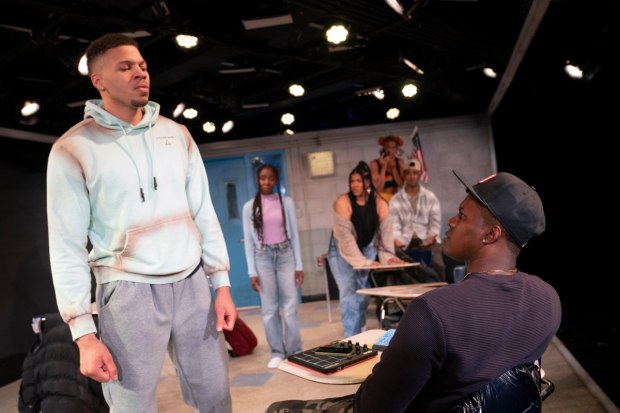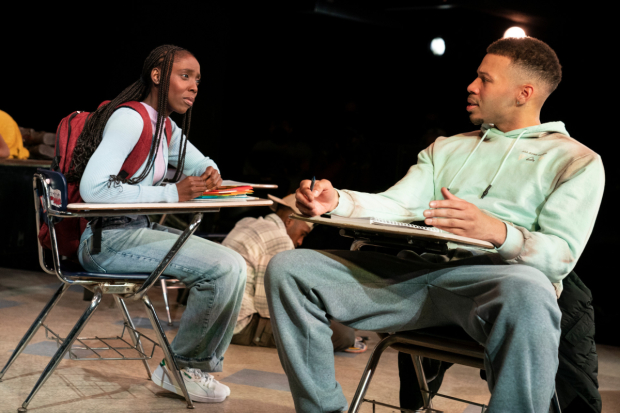Review: Exception to the Rule Confirms an Exceptional New Talent
Dave Harris’s intriguing world-premiere play at Roundabout Underground follows his incendiary ”Tambo & Bones” earlier this year.

(© Joan Marcus)
Exception to the Rule was supposed to be Dave Harris's New York debut play before the Covid-19 pandemic shuttered Roundabout Underground's initially planned 2020 world-premiere run. Instead, his play Tambo & Bones, presented earlier this year by Playwrights Horizons, became the NYC theater scene's introduction to the playwright — and what an invigoratingly confrontational and uncompromising debut it turned out to be! If Harris's newer play slightly disappoints those who saw Tambo & Bones, that's because matching a work as incendiary and inflammatory as that one is a tall order. But rest assured, Exception to the Rule provokes plenty.
The set-up is simple: six Black high-school teenagers are stuck in after-school detention. A gritty inner-city take on The Breakfast Club, we wonder? But a conveniently placed bit of static obscuring the time during the second intercom announcement (voiced by Daniel Breaker) suggests something stranger going on underneath, as does the fact that the teacher presiding over this detention session, Mr. Bernie, appears to be running perpetually late. Reid Thompson and Kamil James's slightly skewed-angle set design of this particular classroom heighten the strangeness and add an isolated, surreal feel, especially with the neon lights lining the sides.
Though there are six characters in Exception to the Rule, one of them eventually emerges as a central figure: Erika (MaYaa Boateng), the kind of seemingly innocent, compliant, academically strong student no one would ever expect to get detention in the first place. She stands in stark contrast to the rest of the students (Malik Childs, Mister Fitzgerald, Toney Goins, Amanda Jahava, and Claudia Logan round out the excellent ensemble), all of them much more volatile in nature, all of them operating with a kind of fearful yet resigned acceptance of being trapped in a cycle of misbehavior and punishment.
That vicious cycle gives Exception to the Rule its heft as an allegory, especially when Harris focuses his attention on Erika. She's the one student who "played by the rules" in order to impress her teachers, and, arguably, white society in general. But is Erika the traitor that her peers appear to think she is, or is she pointing a legitimate way forward for them that they simply refuse to see? Harris is less interested in exalting one position over another than in picking away at gray areas: whether there is in fact a line in which a Black person becomes "white," and whether that inherently means losing a part of one's own cultural identity.

(© Joan Marcus)
In this, Exception to the Rule proves to be very much of a thematic piece with Tambo & Bones, which took a much more Brechtian, fourth-wall-breaking approach to posing similar questions about race, identity, and perception. But while Tambo & Bones seemed designed to make audience members feel as uncomfortable as possible, Exception to the Rule aims to provoke thought and reflection in more indirect ways. Whether you find Harris's social allegory in this work intriguingly thorny and complex or merely heavy-handed will depend on your personal experiences. My own reaction rarely rose beyond a certain sociological and aesthetic detachment, but I found the broader societal implications fascinating to contemplate in retrospect.
At the very least, the play is well-served by its production. The ensemble infuses these allegorical totems with boundless reserves of humanity, allowing us at least a modicum of emotional investment in their existential fates. Boateng stands out in the way she shades even her character's most seemingly innocent gestures with suggestions of a darker side underneath. Miranda Haymon expertly balances the play's mix of naturalism and surrealism, with Sarita Fellows costuming the cast in persuasive teenage high-school attire even as Lee Kinney's at times blaring sound design and Cha See's lighting design turn up the heat when events turn toward the strange.
More than any of these technical elements or the performances, however, most people will come away from Exception to the Rule pondering Harris's take on an environment in which even the way out for troubled inner-city Black students has unsettling personal and social implications, as well as the elusive and poetic way he dramatizes that struggle. With this and Tambo & Bones, Harris has announced himself as a fresh, galvanizing new playwriting talent whose vision we will hopefully be wrestling with for some time.









